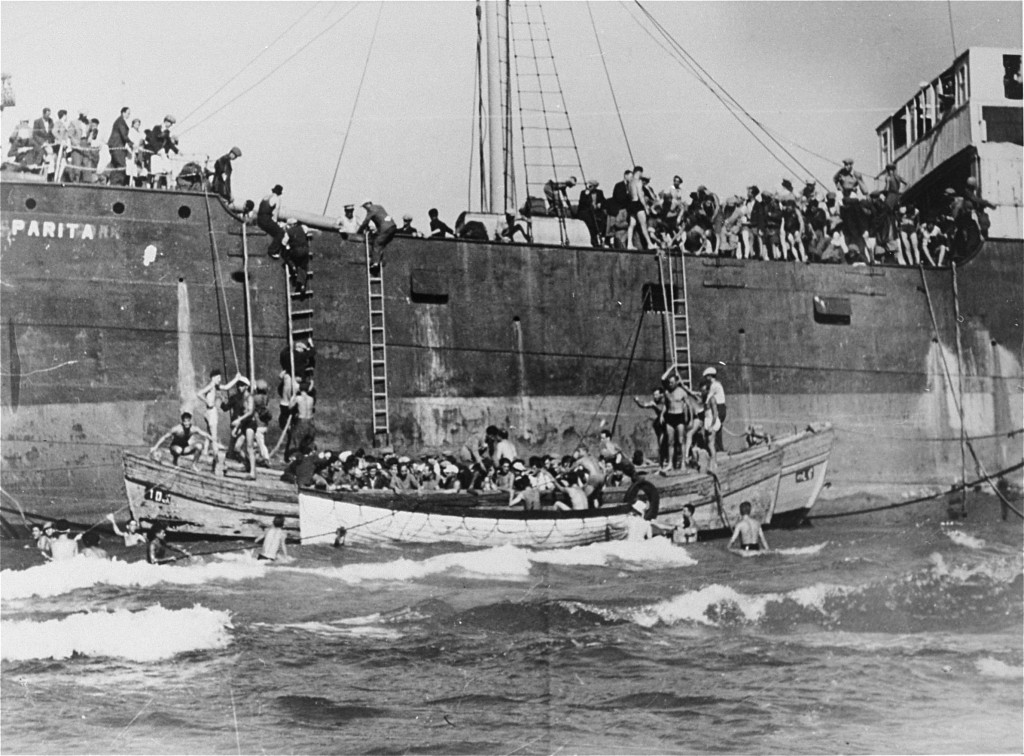
Aliyah Bet
Aliyah Bet is the Hebrew term that refers to the clandestine immigration of Jews to Palestine between 1920 and 1948, when Great Britain controlled the area.
The Hebrew word "aliyah" (literally, "ascent") commonly refers to immigration to the Land of Israel, while "bet" (the Hebrew equivalent of the letter "B") here implies something unofficial or secret. The phrase Aliyah Bet describes the movement of Jewish refugees, many of them survivors of the Holocaust, not permitted to enter Palestine by the British authorities. Initiated by Zionist activists as the urgency for Jews to leave Europe intensified, this phenomenon was referred to by the British as "illegal" immigration. By 1948, well over 100,000 people had taken this route, including more than 70,000 Holocaust survivors.

Mossad l'Aliyah Bet
The number of immigrants officially allowed to enter Palestine always failed to meet demand and, in periods of political crisis, the British severely restricted or even forbade entry. Jewish refugees found many ways to evade the British immigration quotas. However, travel by ship soon became the main mode of transport for Aliyah Bet, with thousands arriving each year. In 1938, the Mossad l'Aliyah Bet (Organization for "Illegal" Immigration, established by the Jewish leadership in Palestine) began coordinating these efforts. During World War II, Aliyah Bet continued, but at a slower pace and under more dangerous conditions, with hundreds of lives lost at sea. Despite the dangers, 62 such voyages were carried out from 1937 to 1944.
Brihah
After World War II, the number of Jewish refugees seeking to enter Palestine increased dramatically. The horrors of the Holocaust, coupled with postwar antisemitism and violence, prompted most survivors to leave Europe. In particular, tens of thousands living in displaced persons camps, almost all in the American zone of occupation, sought to join the Jewish community in Palestine. Organized by the Mossad l'Aliyah Bet and using an underground network known as the Brihah (Hebrew for "flight"), Holocaust survivors moved from the displaced persons camps (primarily in Germany, Austria, and Italy) or from elsewhere in eastern Europe to gathering points in port cities (typically in Italy, France, Yugoslavia, or Greece). Available boats were usually substandard, often old cargo ships, and were overcrowded with passengers.
Following the lengthy, uncomfortable journey, over 90 percent of the ships were intercepted by the British navy. British authorities forcibly moved the refugees to detention camps, primarily on the Mediterranean island of Cyprus. By 1948 the British held over 50,000 Jewish refugees in internment camps on Cyprus.
Exodus 1947
This policy proved a public relations disaster for the British government, with foreign press coverage of the plight of the refugees arousing sympathy. In particular, the case of the Exodus rallied world opinion.

This ship, carrying some 4,500 Jewish displaced persons, set sail from France in July 1947 and was intercepted by British destroyers even before entering Palestine's territorial waters. The passengers resisted removal and violence ensued, resulting in three refugees killed and many injured. The passengers were forced to return to Marseille, their point of embarkation; however, French authorities refused to remove them for almost a month. Finally, the British sailed the vessel to Hamburg, removed the passengers by force, and interned them in a British-administered holding camp.
The sight of Jewish refugees, many of them recently freed from Nazi concentration camps, being held in detention camps on German soil was disturbing. It also challenged the image of the British as liberators, provoking an international outcry.
From the British Mandate of Palestine to the State of Israel
In November 1947, the United Nations voted to partition Palestine into two countries (one Jewish, one Arab). British troops began to withdraw from Palestine in April 1948, and in May 1948 the Zionist leader David Ben-Gurion proclaimed the establishment of the modern state of Israel. All limitations on Jewish immigration were immediately lifted.
Critical Thinking Questions
- What pressures and motivations affected the decisions of the refugees to attempt the perilous journey described in this article?
- How did the United States and other countries interpret their role when facing a catastrophic refugee crisis in 1939?